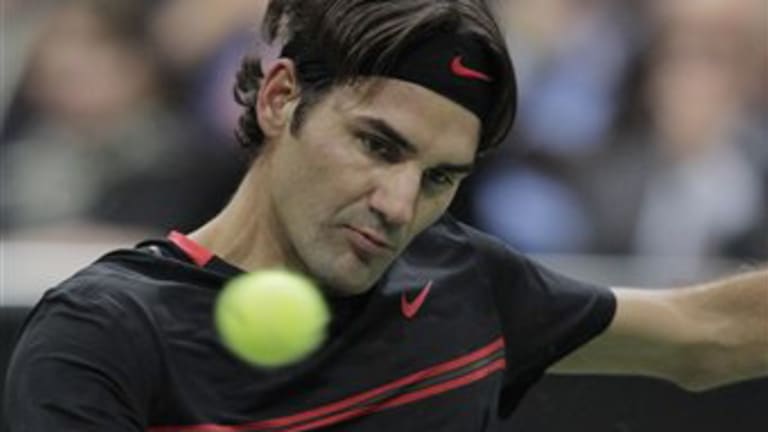Maybe it's the strength of the game at the moment. Maybe it’s the Aussie Open afterglow. Maybe it’s the Twitter effect—even small events seem more exciting when there’s lots of chatter about them—or maybe it’s the nice weather around here. But this has been a surprisingly entertaining and upbeat February. I used to think of the month as a black hole in the tennis calendar, filled with appearance-fee boondoggles, a place where the buzz and interest from Melbourne went to die. And there are still elements of that. But from Victoria Azarenka’s consolidation in Doha to John Isner’s breakthrough in Davis Cup to Milos Raonic’s ominous serving in San Jose, this has also been a fun and maybe even significant few weeks of tennis.
Yesterday alone there were three results of note. I’ll start the week with a quick review of two of them.
Or Maybe it’s the Federer Effect…
There’s been a lot of talk among the top men about their onerous mandatory commitments, which include Slams, Masters, and the odd 500-level event or two. While this can add up over the course of the year, you don’t need to look any farther than last week’s 500 in Rotterdam to see the effect that one star has on a smaller tournament. Rotterdam had a nice draw, but Roger Federer’s presence at the top of it lifted the event into must-see territory. Over the weekend, it also brought a lot of energy into the often-quiet main arena there.
That seemed to put a charge into Federer, who was coming directly from his country’s dismal Davis Cup weekend against the Americans. He started slowly in Rotterdam, and was on the ropes against Nikolay Davydenko in the semis, but Federer finished with another masterful performance against Juan Martin del Potro for his 71st career title. It was such an invigorating week that he even speculated that, who knows, he might, like Andre Agassi, play until he’s 36. So much for enjoying him while we can; it sounds like we should be saying that about Nadal and Djokovic instead.
Speaking of Davydenko, his performance was another reason to cheer this tournament. Some of the old machine-gun magic was back in his racquet, both against Richard Gasquet in the quarters and Federer in the semis. Up a set and a break in the latter match, he could have easily reached the final based on how he was striking the ball.
But Federer had no such problems with del Potro, a man he seems to have solved for the moment. The key is never letting tennis’s tank find his rhythm and get his baseline game rolling forward—as Federer knows, it can roll right over you. Federer won with a mix of slice backhands and topspin, with surprise changes of direction, with swing volleys, with a stellar passing shot at break point in the second set, and with a classy backhand drive/drop shot/overhead combination in the first set. In other words, with a little bit of everything.
In both Rotterdam and Melbourne, Federer jumped ahead of del Potro early and then held off a later charge. This time the Argentine had five break points in the second set. His best opportunity came at 2-3, 30-40, when he bullied his way forward only to overswing and send an easy backhand long. On the next break point, in that same game, it was Federer who moved forward for a mid-court forehand. He made no mistake with it, curling the ball past del Potro for a crosscourt winner.
Six more years of this kind of variety and mastery? Del Potro must not like hearing that, but it’s music to the ears of tournament directors, and fans, everywhere.
!VaDéjà Vu All Over Again
What do they say when something is a little too familiar? It’s eerie? Victoria Azarenka’s 2012 is starting to feel eerily familiar to Novak Djokovic's 2011. As in: Talented but volatile second-fiddle solves mental and, so far, physical issues to win her first 17 matches; she uses outstanding returns and measured baseline aggression to finally take advantage of all of her athletic gifts with; and after dominating the Australian Open final she appears to gain even more confidence through the Gulf swing. That’s how Djokovic’s first couple of months went last year, and that’s how Vika is looking after her win in Doha last week. Call it the new template for (relatively) late-blooming dominance.
Azarenka didn’t drop a set in Doha, and lost just 18 games in total. Against U.S. Open champ Sam Stosur, she controlled the rallies from the first shot and won nine of the opening 10 games. Azarenka’s game in Doha also reminded me of Djokovic’s in its comprehensiveness. She didn’t go for broke, à la Petra Kvitova, but there didn't appear to be any exploitable weaknesses, either. Every shot was hit with conviction, and she was decisive with her selection of them.
You can take issue with Azarenka's grunting, which she now compares to an uncontrollable process like snoring (I'm not buying it). You might take issue, as her opponent Agnieszka Radwanska appeared to do, with Vika’s teary, drama-filled reaction to her ankle injury in their semifinal. But I liked the fact that she didn’t play if safe, the way a lot of players do these days, and retire from that match. Her hobbling, determined performance was gutsy—perhaps a champion’s new pride? Let’s hope she doesn’t regret it.
Most impressive is Azarenka’s concentration; she'saggressive with it. We’ve seen players use their serves and forehands and even their drop shots as ways to attack, but watching her throw up her service toss and stare for an extra second across the net in Doha, it seemed like Vika had a new weapon: her eyes. They don't lose their focus on what's in front of them.
